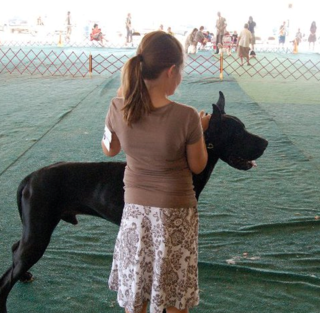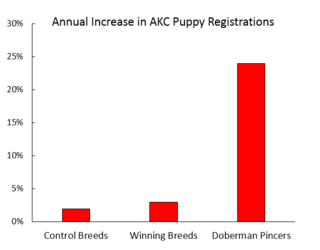Animal Behavior
Does Breed Popularity Go Up After A Dog Wins At Westminster?
How we tested the "Westminster surge hypothesis"
Posted February 19, 2016

For me, nothing beats the midwinter doldrums like spending a couple of nights watching the Westminster Dog Show on TV. This canine beauty pageant is one of my guilty pleasures. I agree with critics who point out problems in the show dog world – the elitism, the terrible genetic disorders that plague purebreds, and the moral argument for adopting mixed-breed shelter dogs. But when February rolls around, I am drawn to the pageantry, the bizarre names of the dogs (“Ch Flatout Fuzzy Green Fruit”), and the lineup of obscure new breeds like the truffle-hunting Lagotto Romagnolo. I am fascinated by the arcane judging system, and "voice of Westminster" David Frei’s descriptions of canine personality traits (“The Irish Setter is a dog you would like to have beer with.”). And I’ve hung around with dog show people long enough to appreciate their enthusiasm and dedication to chasing an arbitrary platonic ideal – the American Kennel Club’s breed standards.
In the finals this year, I was rooting for Rumor, a handsome German shepherd. However, the judge, a Canadian psychiatrist named Richard Meen, awarded the top prize to a lanky three year old German Short-Haired Pointer named CJ who seemed a bit mystified by all the hoopla. Based on American Kennel Club registrations, German Short-Haired Pointers are the 16th most popular purebred dog in the United States. Conventional wisdom holds that over the next couple of years we should see a dramatic rise in their popularity. I call this the “Westminster surge hypothesis.”
And here is why I think it is wrong.
The Rise and Fall of Doberman Pinscers
In 1953, a Doberman Pinscer named Rancho Dobe's Storm was named Best in Show at Westminster. What was unusual was the fact that Rancho had just won the prize the previous year. Did this two-fer spark a run on the demand for Dobie puppies? No. over the five years following Rancho’s consecutive victories, the annual number of Dobermans registered with the AKC dropped five percent.
Dobermans, however, did have their proverbial 15 minutes of fame, but it did not occur for another 8 years. In 1961, Doberman puppy registrations began to sky rocket, They rapidly rose from 3,619 in 1961 to 82,000 in 1978 and they became the second most popular dog in America. In the years between 1968 and 1973, Doberman registrations were rising about 24% a year.
No one really knows why the popularity of the breed suddenly skyrocketed. (In her wonderful new book. Pit Bull: The Battle Over an American Icon, author Browen Dickey argues that the sudden surge in Dobie popularity was a combination of their reputation as guard dogs and rising crime rates in the 1960s and 70s). But the public tastes in purebred dogs are fickle. In 1978, Dobermans began to tank. Over the next ten years, puppy registrations fell 97%.
So the spectacular rise and fall of the popularity of Doberman Pinscers was unrelated to Rancho’s Westminster victories, But there are limits to what you can learn from one case. My colleague Steve Elias and I decided to systematically examine the role Westminster winners have on our culture’s preferences for pets. To test the "Westminster surge hypothesis” we used the biggest data set in the history of anthrozoology -- 60 million puppies registered with the American Kennel Club.
Testing the “Westminster Surge Hypothesis”
A dozen years ago, the American Kennel Club gave me a present which turned out to be a gold mine – the number of puppies for each AKC recognized breed for each year between 1946 and 2002. (The data set was later expanded to the years 1927 to 2005). My colleagues and I have used this extraordinary data to examine how factors such as movies, breed qualities, and even random chance affect rapid changes in our tastes in canine companions. (Links to these papers can be found at the end of this post.) Steve and I realized that we could use changes in annual puppy registrations to test the claim that winning the Westminster Dog show produces a large jumps in the popularity of the winning breed.
We did this in two ways. First, we compared the growth trajectories of new registrations for winning breeds for the four years prior to their win with their rates of growth four years after they won. If the Westminster surge hypothesis is correct, the rates of puppy registrations in these breeds should increase substantially in the years after their wins.
Was this the case? No. There was hardly any increase in rates of growth in breed popularity following Westminster wins. While there was a slight tendency for puppy registrations to increase faster after wins, it was not “statistically significant.” Indeed, we found that being named Best in Show accounted for less than 1% of the difference in breed growth rates.
Next, we compared the rates of growth in the popularity of each winning breed with the rates of increases in a control group. This group consisted of the nonwinning breeds closest in AKC registrations to the winners. For example, a Scottish Terrier was named Best in Show in 1965 when 5,457 Scottish Terriers were registered with the AKC. The closest non-winning breed in popularity was the Weimaraner (5,412 puppy registrations). We tested the surge hypothesis by comparing the five year post-win growth patterns of the winning breeds with breeds in the non-winning control group.

As shown in this graph, the analysis revealed that winning Westminster has little, if any, impact on the popularity of pedigree dogs. Between 1944 and 2002, winning breeds increased an average of 3% a year over five years after they won as compared to a 2% annual increase in the control breeds. By comparison, in the midst of their decade-long spike in popularity, Doberman puppy registrations were increasing at a rate of nearly 25% a year.
The Bottom Line
I'm sorry CJ, but the Westminster surge hypothesis is wrong. Your unexpected victory this year is unlikely to cause German Short Haired Pointers to shoot up and suddenly give Labs a run for their money as America’s most popular dog.
For journal articles on our research using dog breed popularity to study rapid changes in preferences for pets, see here, here, here, here, here, and here.
And to learn why dog show judging is inherently unreliable, see this Animals and Us post.




